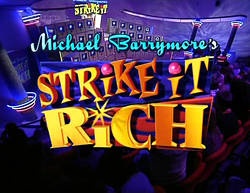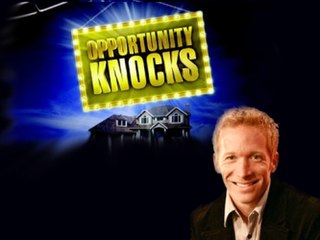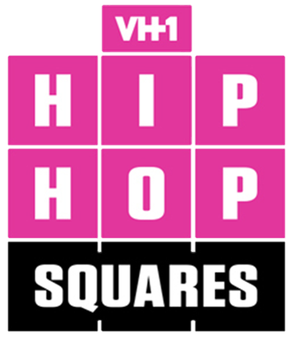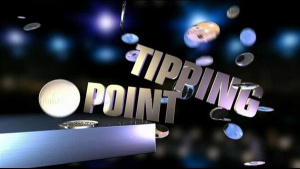Who Wants to Be a Millionaire? is an international television game show franchise of British origin, created by David Briggs, Mike Whitehill and Steven Knight. In its format, currently owned and licensed by Sony Pictures Television, contestants tackle a series of multiple-choice questions to win large cash prizes in a format that twists on many game show genre conventions – only one contestant plays at a time, similar to radio quizzes; contestants are given the question before deciding whether to answer, and have no time limit to answer questions; and the amount offered increases as they tackle questions that become increasingly difficult. The maximum cash prize offered in most versions of the format is an aspirational value in local currency, such as £1 million in the UK or ₹75 million in India.

Press Your Luck is an American television game show created by Bill Carruthers and Jan McCormack. Contestants answer trivia questions to earn "spins" on a randomly cycling game board. The board's spaces display cash, prizes, extra spins, special items, or the show's mascot, a cartoon creature known as the Whammy. Landing on a Whammy eliminates any cash and prizes accumulated while also displaying a short comedic animation. Its format is a revival of an earlier Carruthers production, Second Chance, which was hosted by Jim Peck and aired on ABC in 1977. The original version of Press Your Luck aired on CBS between 1983 and 1986. This version featured Peter Tomarken as host, Rod Roddy as announcer, and Carruthers as both director and voice of the Whammy. The original incarnation of the show gained significant media attention in 1984 for contestant Michael Larson, who won over $100,000 after memorizing the original pattern of the game board.

Whammy! is an American television game show that aired new episodes on Game Show Network (GSN) from April 15, 2002, to December 5, 2003. The series was produced by Fremantle North America, in association with GSN. The main goal of the game is to earn as much money and prizes as possible through collecting spins by answering trivia questions correctly, then using those spins on a gameboard to win various prizes and cash amounts while attempting to avoid the show's eponymous character, the "Whammy." Contestants who do land on a Whammy lose all their prizes accumulated to that point; four Whammies eliminates a contestant from the game. The program is an updated version of Press Your Luck, which originally aired on CBS from September 19, 1983, to September 26, 1986. The series was taped at Tribune Studios and was hosted by Todd Newton, with Gary Kroeger announcing. The show aired in reruns on GSN until 2017, and came back on May 11, 2020, up until October 1, 2021.

Strike It Lucky is a British television game show that ran from 29 October 1986 to 23 August 1999, originally produced by Thames Television for ITV, and presented by the British comedian Michael Barrymore. It was based on the American game show Strike It Rich that aired in 1986.

Split Second is an American game show that was created by Monty Hall and Stefan Hatos and produced by their production company, Stefan Hatos-Monty Hall Productions. Three contestants compete to answer three-part trivia questions to win cash.

Tic-Tac-Dough is an American television game show based on the paper-and-pencil game of tic-tac-toe. Contestants answer trivia questions to put up their respective symbol, X or O, on a tic-tac-toe board. Three versions were produced: the initial 1956–59 run on NBC, a 1978–86 run initially on CBS and then in syndication, and a syndicated run in 1990. The show was produced by Barry & Enright Productions. However, the rights to the format are controlled by NBCUniversal.

Who Wants to Be a Millionaire? is a British television quiz show, created by David Briggs, Steven Knight and Mike Whitehill for the ITV network. The programme's format has contestants taking on multiple-choice questions based upon general knowledge, winning a cash prize for each question they answer correctly, with the amount offered increasing as they take on more difficult questions. If an incorrect answer is given, the contestant will leave with whatever cash prize is guaranteed by the last safety net they have passed, unless they opt to walk away before answering the next question with the money they had managed to reach. To assist in the quiz, contestants are given a series of "lifelines" to help answer questions.
Sale of the Century is an Australian prime time game show that aired on the Nine Network from 14 July 1980 to 29 November 2001. It is based on both Great Temptation that aired from 1970 to 1974 and on the original Sale that first aired in the United States from 1969 to 1973. The Australian format of Sale has since been used internationally, including in a revived US version that aired from 1983 to 1989.

Wheel of Fortune is a British television game show based on the American show of the same name created by Merv Griffin. Contestants compete to solve word puzzles, similar to those used in Hangman, to win cash and prizes. The title refers to the show's giant carnival wheel that contestants spin throughout the course of the game to determine their cash and/or prizes.

Are You Smarter than a 5th Grader? is an American quiz game show. It originally aired on Fox where it was hosted by Jeff Foxworthy. It is produced by Mark Burnett. The show premiered as a three-day special which began on February 27, 2007, with the first two shows each a half-hour in length. Regular one-hour episodes began airing Thursdays from March 1 through May 10, and the first season continued with new episodes beginning May 31. Are You Smarter Than a 5th Grader? was picked up for the 2007–08 season, which began on September 6, 2007, and aired in the same timeslot. Following the end of the original run of the primetime version on September 18, 2009, a first-run syndicated version of the show ran from September 2009 to May 2011, with Foxworthy returning as host. On May 26, 2015, the program returned to Fox for a new, 4th season, with Foxworthy, again, returning as host. On February 14, 2019, it was announced that the program would be revived on Nickelodeon with new host John Cena, airing from June 10 to November 3, 2019. There are new reports that the show may be returning on Amazon Prime Video with new host Travis Kelce.
Power of 10 is an international Sony Pictures Television game show format featuring contestants predicting how a cross-section of local people from the host broadcaster's country responded to questions covering a wide variety of topics in polls conducted by the broadcaster and production company.

Are You Smarter than a 5th Grader? is an Australian quiz show produced by Roving Enterprises that debuted on Network Ten on 26 September 2007. It is hosted by popular TV personality Rove McManus. Filming for the show commenced on 11 September 2007 at Global Television Studios in Forest Hill.
Are You Smarter than a 5th Grader? is a game show franchise that was co-created and produced by Mark Burnett, Barry Poznick and John Stevens. Adult contestants answer questions, as if they came from an elementary grade school quiz. The original U.S. version debuted on the Fox Broadcasting network on February 27, 2007, with host Jeff Foxworthy, airing on Fox until 2009, as a syndicated TV series, between 2009 and 2011, and then revived on Fox in 2015, and again on Nickelodeon in 2019, with new host, John Cena. The Are You Smarter than a 5th Grader? format, has since been replicated in several other countries, some versions under the same title, and some under modified ones.

Opportunity Knocks is a 2008 game show hosted by J. D. Roth and executive produced by Ashton Kutcher and his Katalyst Productions. It premiered on September 23, 2008 on ABC and City in Canada, but received low ratings, especially in the 18–34-year-old age demographic, and was canceled after three episodes.

Hip Hop Squares is an American television game show originally hosted by Peter Rosenberg, which debuted on MTV2 on May 22, 2012. The show is a licensed format of CBS Television Distribution's Hollywood Squares featuring mostly rappers. The MTV2 version of the show was taped in Brooklyn, New York. The VH1 version was taped in Hollywood, California.

Tipping Point is a British quiz show that has aired on ITV since 2 July 2012. The show also airs repeats on U&W, which is owned by the UKTV network, and Really, which is owned by Warner Bros. Discovery. The programme is presented by Ben Shephard and features three players answering questions on the subject of general knowledge in order to win counters, which they use on a large coin pusher arcade-style machine, that represent (mainly) cash prizes.
The Winner Is is an American singing competition television series which aired on NBC. Hosted by Nick Lachey, the seven-episode series featured singers of all ages competing for a chance to win $1,000,000. The concept of the show revolved around a series of "battles", in which two contestants compete for the votes of a jury consisting of 101 music professionals. The show premiered on June 10, 2013.

Raid the Cage or Kluv Hazahav, {Golden Cage}, is an Israeli game show, where couples complete trivia and physical challenges to haul prizes from a gigantic cage before the doors slam shut. The original version aired on Channel 2 (Reshet), and hosted by Avi Kushnir. The show is distributed worldwide by Sony Pictures Television International.
Weakest Link is a television game show which first appeared in the United Kingdom on BBC Two on 14 August 2000 and originally ended on 31 March 2012 when its host Anne Robinson completed her contract. The original British version of the show is still aired around the world on BBC Entertainment and domestically on Challenge. The game begins with a team of eight or nine contestants who take turns answering general knowledge questions within a time limit to create chains of correct answers in a row. At the end of each round, the players vote one contestant, "The Weakest Link", out of the game. Once two players are left, they play in a head-to-head contest, with five questions asked to each contestant in turn, to determine the winner.

Game of Games is an Australian TV game show hosted by Grant Denyer based on the American game show Ellen's Game of Games. It premiered on Network Ten on Sunday, 7 October 2018 at 7:30pm and on 24 November 2018 Channel Ten changed its timeslot to 7:00pm every Saturday. The first season concluded on 15 December 2018.














